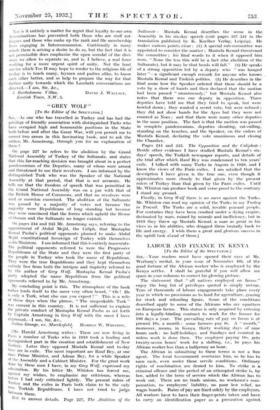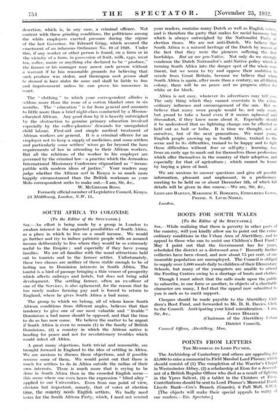LABOUR AND FINANCE IN KENYA [To the Editor of the
SPECTATOR.] Sin,—Your readers must have opened their eyes at Mr. Werburg's recital, in your issue of November 4th, of the good fortune of the African worker who is employed by the Kenya settler. I shall be grateful if you will allow me space in your columns to correct his glowing picture.
The statement that "all natives employed on farms" enjoy the long list of privileges quoted is simply untrue. Tens of thousands of labour engagements take place every year in which no provisions as to land for agriculture, grazing for stock and schooling figure. Some of the conditions described apply to some of the Africans who are squatters on European farms. This status is only acquired by entering into a legally-binding contract to work for the farmer for 180 days a year. The prevailing rate of pay on farms is at present 10s. a month : some farmers pay 8s. A "month," moreover, means, in Kenya, thirty working days of nine hours each: no half-holidays. and Sundays not counted in unless work is done then. The employer paying 10s. gets twenty-seven hours' work for a shilling, i.e., he pays his African worker less than a halfpenny an hour.
The African in submitting to these terms is not a free agent. The local Government overtaxes him, so he has to earn cash, even under these servile conditions. Ordinary rights of combination are denied to him. To strike is a criminal offence and the period of an attempted strike is, by law, added to the term of service which the African has to work out. There are no trade unions, no workmen's com- pensation, no employers' liability, no poor law relief, no wages boards. Rates of pay are fixed solely by the employers. All workers have to have their finger-prints taken and have to carry an identification paper as a precaution against
desertion, which is, in any case, a criminal offence. Not content with these grinding conditions, the politicians among the white employers exerted pressure during the regime of the last Governor, Sir Edward Grigg, which secured the enactment of an infamous Ordinance No. 10 of 1928. Under this, if any worker or other person is found, on a farm or in the vicinity of a farm, in possession of fruit, milk, eggs, meat tea, coffee, maize or anything else declared to be "produce," the farmer or his manager may arrest such person without a warrant if he has reasonable grounds for believing that such produce was stolen, and thereupon such person shall he deemed to have stolen the same and shall be liable to fine and imprisonment unless he can prove his innocence in court.
• The " clothing" to which your correspondent alludes. is • eldom more than the issue of a cotton blanket once in six months. The education " is far from general and amounts to little more than a brief night-class conducted by a Mission- educated African. Any good done by it is heavily outweighed by the obstruction to genuine primary education involved especially by the coffee-planters' demands for unregulated child labour. First-aid and simple medical treatment of African workers are general. It is a criminal offence for an employer not to keep a supply of medicines, and some settlers and particularly some settlers' wives go far beyond the bare requirements of law in attending to their African workers. But all the relations of the worker to his employer are governed by the criminal law—a practice which the Jerusalem International Missionary Conference stigmatized as "incom- patible with modern ideas of justice." Your readers may judge whether the African serf. in Kenya is so much more happily circumstanced than the British workman as your Mob o correspondent seeks to make out.—I am, Sir, &c., W. MCGREGOR Ross,
Formerly official member of Legislative Council, Kenya. 24 IVIiddleway, London, N.W. 11.







































 Previous page
Previous page